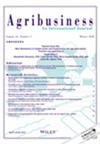Impacts of geopolitics and policy on Latin American biodiversity and water resources
IF 2
3区 经济学
Q2 AGRICULTURAL ECONOMICS & POLICY
引用次数: 0
Abstract
Latin America is a major agricultural producer with important natural resources. Efforts have been made to protect sensitive areas but are hindered by agricultural trade disruptions outside the control of individual countries due to globally integrated crop markets. This analysis assesses the effects of two trade shocks, that is, the war in Ukraine and vehicle decarbonization in the United States (US), on biodiversity and water resources in Latin America. Results show that an increase in maize and wheat exports from the region triggered by the war in Ukraine negatively affects biodiversity in Brazil and leads to cropland expansion into drought‐prone areas in Argentina and Chile. For the case of reduced crop exports from Latin America due to US vehicle decarbonization and the corresponding shift away from US maize ethanol, the pressure on arable land in areas of high biodiversity and water stress is eased. As opposed to agricultural carbon emissions, which have global impacts, biodiversity and water issues have a strong local and regional significance. Regulatory frameworks aiming to protect these regions should be forward looking to detect and shield vulnerable areas from future threats. Other changes affecting global agriculture and trade, for example, sustainable aviation fuels in the US or the European Farm‐to‐Fork policy, need to be anticipated for effective policies in Latin America [EconLit Citations: Q13, Q25, Q34, Q56].地缘政治和政策对拉丁美洲生物多样性和水资源的影响
拉丁美洲是农业生产大国,拥有重要的自然资源。各国一直在努力保护敏感地区,但由于全球一体化的农作物市场,各国无法控制农业贸易的中断,从而阻碍了保护工作的开展。本分析评估了乌克兰战争和美国汽车去碳化这两种贸易冲击对拉丁美洲生物多样性和水资源的影响。结果显示,乌克兰战争引发的该地区玉米和小麦出口增加对巴西的生物多样性产生了负面影响,并导致阿根廷和智利的耕地向干旱易发地区扩展。如果由于美国汽车去碳化以及相应地不再使用美国玉米乙醇而减少了拉丁美洲的农作物出口,那么生物多样性和水资源紧张地区的耕地压力将得到缓解。与具有全球影响的农业碳排放不同,生物多样性和水资源问题具有很强的地方和区域意义。旨在保护这些地区的监管框架应具有前瞻性,以发现并保护脆弱地区免受未来威胁。影响全球农业和贸易的其他变化,例如美国的可持续航空燃料或欧洲的 "从农场到餐桌 "政策,需要对拉丁美洲的有效政策进行预测[EconLit 引用文件:问题 13、问题 25、问题 34、问题 56]。
本文章由计算机程序翻译,如有差异,请以英文原文为准。
求助全文
约1分钟内获得全文
求助全文
来源期刊

Agribusiness
农林科学-食品科技
CiteScore
5.50
自引率
6.20%
发文量
58
审稿时长
6 months
期刊介绍:
Agribusiness: An International Journal publishes research that improves our understanding of how food systems work, how they are evolving, and how public and/or private actions affect the performance of the global agro-industrial complex. The journal focuses on the application of economic analysis to the organization and performance of firms and markets in industrial food systems. Subject matter areas include supply and demand analysis, industrial organization analysis, price and trade analysis, marketing, finance, and public policy analysis. International, cross-country comparative, and within-country studies are welcome. To facilitate research the journal’s Forum section, on an intermittent basis, offers commentary and reports on business policy issues.
 求助内容:
求助内容: 应助结果提醒方式:
应助结果提醒方式:


